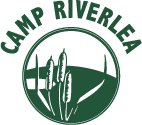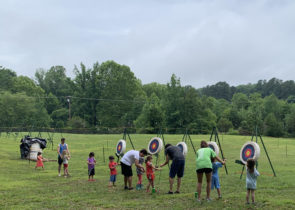Campers participate in daily activities with their age group and enjoy mixed-age groups for special activities and daily all-camp assemblies. Our ratios are 5-8 campers per counselor, which means campers get quality instruction and attention from their instructors.
Spring Break Camps: All campers participate in Agriculture, Archery, Arts & Crafts, Athletics, Canoeing (4th-6th grade), Initiatives (minus the low ropes course), Nature, Performances, Tennis and Hiking. There is a camp wide cookout eat session.
Summer Camp: With a few exceptions based on age (see below), all campers participate in all activities. All campers have daily swimming lessons, and each group goes to each other activity at least 2 times per week. Special activities vary by session and can include the Hobbit Adventure, a carnival, a 4th of July celebration, and the Riverlea Olympics. On the second Thursday of each session, all campers are invited to stay at camp until 7 p.m. for a cookout and the traditional Riverlea Magic Ring ceremony. During sessions 1 and 2, Trolls (rising 4th graders) and older are invited to stay overnight and join us for a campfire, special activities, and sleeping under the stars.
Agriculture
Campers discover where food comes from by exploring the garden and caring for our chickens We have a children’s garden with herbs, fruits, and vegetables, where campers experience everything from worms to planting to harvesting to tasting fresh produce to cooking.
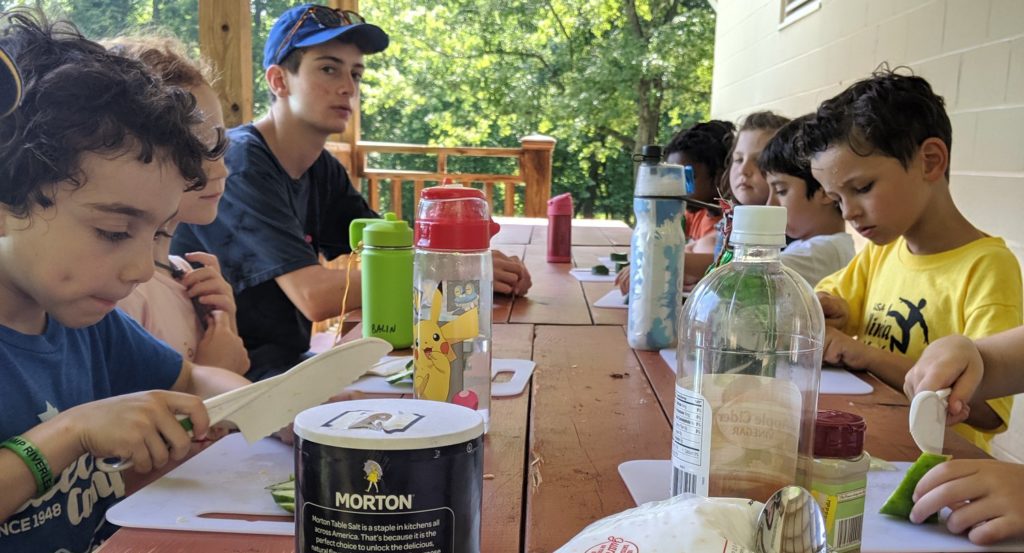
Archery
Our certified archery instructors coach campers in archery safety and skills while tracking each camper’s progress throughout the session. Campers start out shooting at a target 5 yards away, and they build confidence, strength, and coordination as they move up to greater distance based on the number points they accumulate.
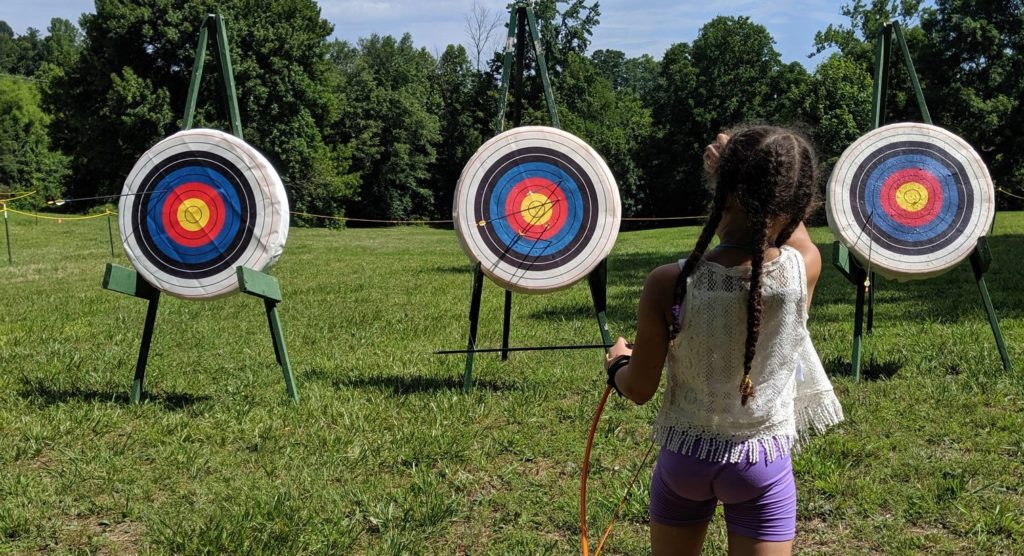
Arts & Crafts
Campers express their creativity, where visual art projects take many forms and use a huge variety of media. Campers draw, sculpt, tie-dye, paint, and create with the help of skilled and supportive arts and crafts counselors. At the end of each session, campers take home their projects and show off their creations.

Athletics
Playing team and cooperative games, campers learn teamwork skills.On the shady athletics field, campers play sports with an emphasis on group collaboration.

Canoeing
Trolls (rising 4th graders) and older participate in canoeing with two certified instructors on Yonder Pond. Campers learn canoe safety and strokes, and they practice by playing games and completing obstacle courses. During Summer Camp the oldest campers (Striders) can earn a special canoe trip down the river, where they dock for a picnic lunch before returning to camp for afternoon activities.

Golf
Trolls (rising 4th graders) and older participate in golf once a week. Campers learn golf strokes and practice their new skills with games and drills in small groups.

Initiatives
Campers build teamwork skills through games and group challenges. Ages 5-7 do this on the ground and ages 8-12 do this on the ground and on a low ropes course. These games help the group energize themselves, learn more about others in the group, develop trust in one another, and solve problems together. Please see our Initiatives FAQ page for more information about this department. (The low ropes course is just used in the Summer, and not during the Spring Break Camp.)

Kayaking
Rising 2nd graders and up learn and practice kayaking on Yonder Pond with two certified instructors. Our kayaking counselors teach safety and make sure everyone is wearing their PFD. Kayaking takes place during Summer camp.
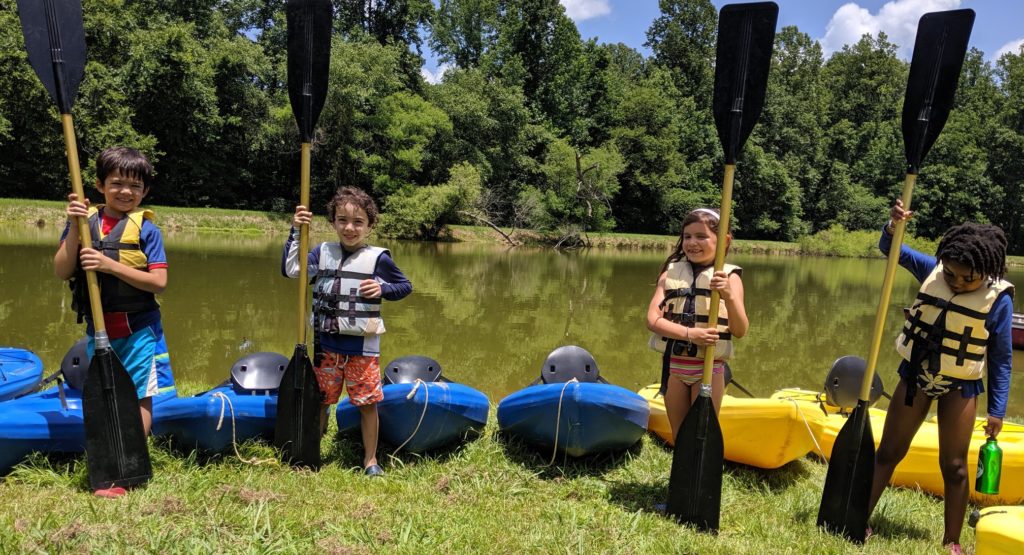
Nature
Campers explore the natural world and learn wilderness skills such as fire making and shelter building. Campers go on river walks and hikes, play games, catch crayfish, and learn to identify plants and animals. This includes a short hike off of camp property to a small waterfall created by a destroyed historic dam.
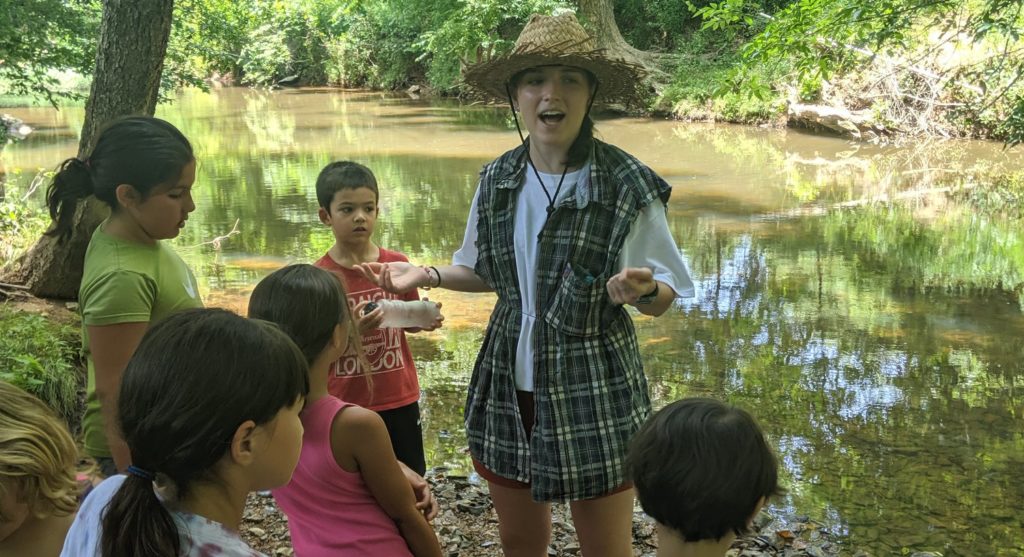
Performances
Through games, improvisation, and skits, campers learn acting skills and practice different ways of expressing themselves.Campers learn about their body in space, assume different character traits and roles, work together, and support one another and sometimes create and perform skits for their groups or the whole camp.
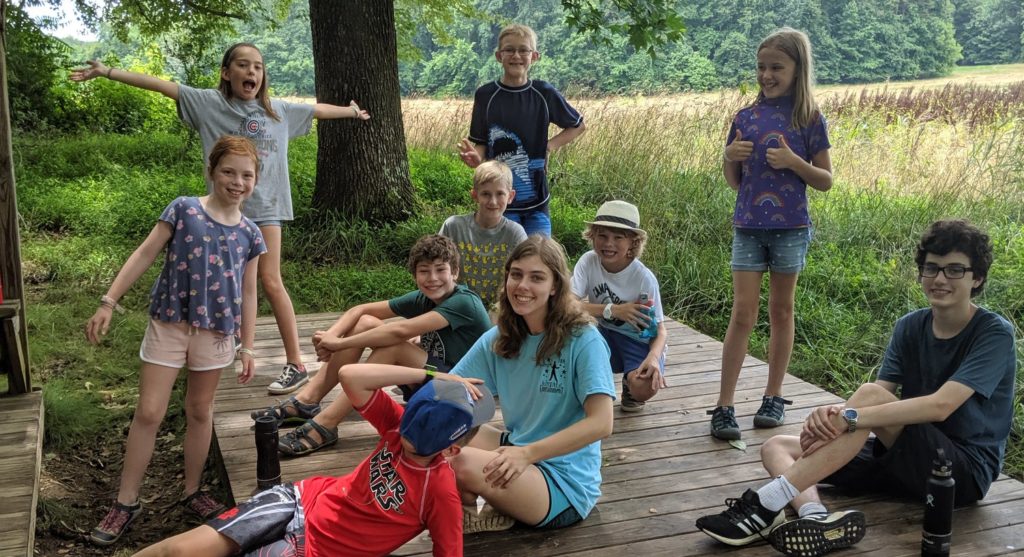
Swimming
All campers have swimming lessons and free swim every day. At Riverlea, our swim counselors instruct campers according to the Starfish Aquatics Institute levels of swimming. This provides structure to our swim program, but also enables campers and parents alike to see and understand the progress each camper makes throughout the session. Beginning swimmers learn the basics of becoming comfortable and safe in the water, floating, and the basics of elementary swim strokes. As campers improve their skills and comfort in the water, they practice more advanced strokes and skills, according to their level, with lap swimming, games, and relays. All of our swimming counselors are certified lifeguards, and are certified to teach the Starfish swimming curriculum. Our goal is for all campers at Riverlea to feel safe and comfortable in the water and to improve their swimming skill level and sense of self-efficacy and discipline.
All campers at Riverlea receive a silicon swim band/bracelet (click here to see a photo). There are three bracelet types, each representing a different swim level:
- The green and white multicolor bands are for campers who are only allowed to swim in our small pool (2′-4′);
- The green bands are for campers who are allowed to swim in the big pool up to the 5′ depth;
- The solid white bands are for campers who can swim at all depths of both pools (up to 8′).
There are a few important rules regarding the bands:
- Campers must be wearing a band in order to get into the pool.
- To avoid losing them, we ask campers to keep their bands on at all times throughout the session (even at home).
- If a camper is without a band and would like to swim, she or he may temporarily borrow a band in exchange for one of their shoes.
Tests to move up a level:
To earn a green band, a camper must: continuously *swim 25m without touching the sides or bottom, then tread water for 1 minute.
To earn a white band, a camper must: dive into the deep end (8′) and touch the bottom; then continuously *swim two lengths (50m) of the big pool without touching the sides or bottom; then tread water for 2 minutes, 1 minute of which must be without using hands (hands above head or hands under armpits).
*When swimming lengths of the pool, campers must do breast stroke or front crawl and demonstrate rhythmic breathing throughout the entire distance.
Beyond the test guidelines above, it is up to the discretion of our head swimming counselor to assign swim bands. There is nothing more important than the safety of our campers. A camper’s ability to pass a particular swim test is a necessary, but not sufficient requisite to our ability to feel confident maintaining his or her safety in other areas of the pool. In other words, we will not move a camper up a level if we think doing so will put them into dangerous situations.
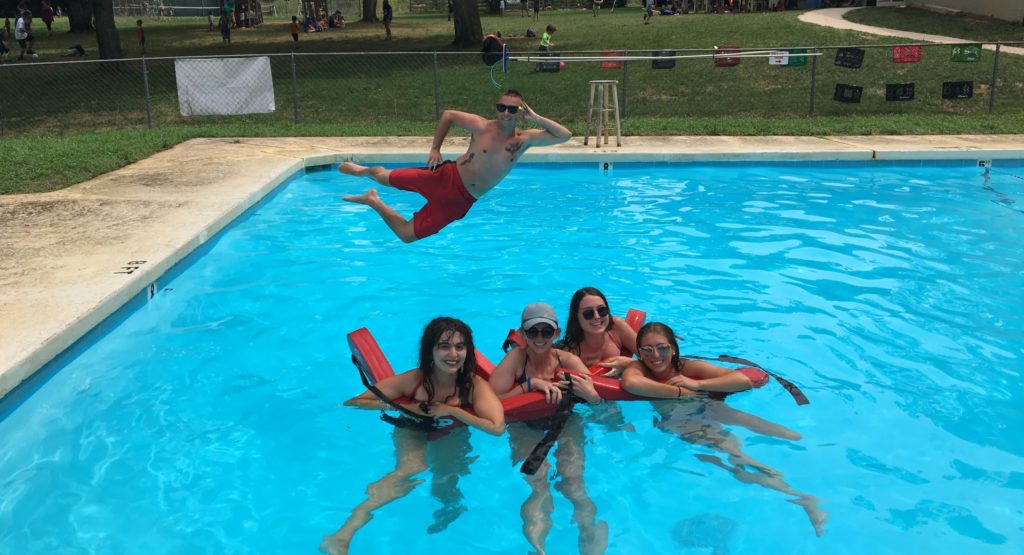
Tennis
Trolls (rising 4th graders) and older participate in tennis. Our tennis counselors are experienced players who instruct campers in strokes and form through drills and games. We provide all equipment needed.

